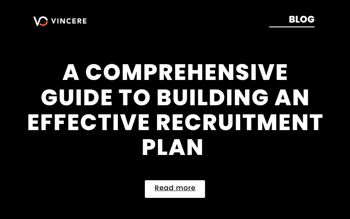
In the ever-evolving world of talent acquisition, ask yourself this: Does your recruiting team have a concrete hiring roadmap for the upcoming year, or are you constantly in firefighting mode?
Without an effective recruitment plan, you put your agency at risk. Struggling to locate top talent, fill job vacancies and make placements on time could cause efficiency and productivity levels to drop.
At Vincere, we understand that securing top-tier talent necessitates a well-structured and robust hiring strategy, one that encompasses every phase of the recruitment cycle. Your recruitment plan should be meticulously designed to address the unique requirements of your firm.
This guide will help you map out an effective recruitment plan, enabling you to efficiently and promptly identify the most suitable candidates for your job openings.
So, let's conquer recruitment together with a structured hiring plan.
Get ahead with an effective recruitment plan
A well-defined recruitment strategy outlines and navigates the entire recruitment process, from crafting job descriptions to sourcing top-tier talent and successfully onboarding them.
What is needed in a recruitment plan?
An efficacious recruitment plan should be tailored to your agency's unique needs and each role you're looking to fill. Key components should include job descriptions, role requirements, sourcing tactics, and budget allocation.
What makes an effective recruitment plan?
The cornerstone of an efficient recruitment plan is a distinct, measurable objective. The strategy should be comprehensive and detailed, guiding you seamlessly from the beginning to the end of the hiring process. It should also incorporate recruitment metrics to track success.
How to develop a recruitment plan
Developing an effective recruitment plan requires careful consideration of several factors. Here are the steps you need to take:
1. Set goals
Recruiters should set SMART goals (that are Specific, Measurable, Achievable, realistic, and Time-Based) in order to ensure a successful recruitment plan. Specific goals should include the number of positions to be filled and the desired candidate qualifications. Additionally, the time frame for filling each position should be established in order to ensure that the recruitment plan's goals are met within a reasonable timeline.
For example, a recruiter may aim to fill five roles with candidates who have at least 5 years of experience in a specific industry within two months.
2. Conduct a skills gap analysis
In order to ensure an effective recruitment plan, it is essential to identify the skills needed for future roles. This requires an understanding of the current and desired demands of each position. A skills gap analysis can help recruiters assess existing skills in the company, compare them with desired skills, and develop a plan to fill any gaps that may exist.
3. Custom candidate persona
Creating a customer candidate persona is essential for recruiters to identify their ideal candidates and create an effective recruitment plan. In order to do this, they should analyze the job requirements and develop a profile that outlines the desired skills, qualifications, and experience. This can help them focus their search on the right type of candidates who are most likely to be successful in the roles.
4. Develop a sourcing strategy
Developing a comprehensive sourcing strategy is key to an effective recruitment plan, as it will help recruiters identify and attract the best candidates for each role. This should include utilizing different channels such as job boards, social media platforms, referrals, and recruitment events. Additionally, they should use targeted outreach strategies such as personalized emails and outreach campaigns.
5. Implement a recruitment process
The recruitment process should be tailored to each position, including steps such as screening resumes, conducting interviews, and administering assessment tests. Additionally, recruiters should consider using technology-based tools such as Applicant Tracking Systems to streamline the process. Automating certain tasks can help save time and resources while also providing insights into the recruitment process.
6. Set a budget
Finally, recruiters should set a budget for each recruitment plan in order to ensure that they are spending their resources effectively. This should include costs associated with advertising positions, attending job fairs and other recruiting activities. Additionally, they should consider the cost of onboarding new employees and any other associated costs.
7. Monitor and revise the plan
Once a recruitment plan is implemented, recruiters should track its progress and make adjustments if necessary to ensure that it is meeting their goals. This includes monitoring metrics such as time-to-hire and cost-per-hire to assess the efficiency of the process.
Tips for Building an effective recruitment plan
These tips can help recruiters create an effective recruitment plan that meets their needs and achieves its desired outcomes. By following these steps, they can ensure that they are able to find the best candidates in a timely and cost-effective manner.
- Visualize your recruiting activity: This helps recruiters see the big picture of their recruitment efforts and identify any areas that might need improvement.
- Develop comprehensive job descriptions: A job description should include the desired skills, qualifications, and experience, as well as a clear overview of the role and responsibilities.
- Utilize technology: Leveraging advanced recruitment technologies can help streamline the process, reduce costs and ensure that recruiters are focusing their efforts on the right candidates.
- Be data-driven: It’s important to gather data and track metrics in order to understand the recruitment process and identify areas of improvement.
- Continually review and refine: It's critical to track the progress of your recruitment strategy and make necessary modifications to ensure it meets its objectives. This way, you can guarantee that you're attracting the best candidates while simultaneously enhancing your recruitment effectiveness.
In conclusion, creating an effective recruitment plan can boost your recruitment efficiency, saving time, resources and ensuring top-tier talent acquisition. By leveraging the tips mentioned above, you can find the perfect match for each role, build a successful team, and reach your hiring goals. Remember, with the right recruitment strategy, success is just around the corner.
Here's to your success in talent acquisition. Good luck.